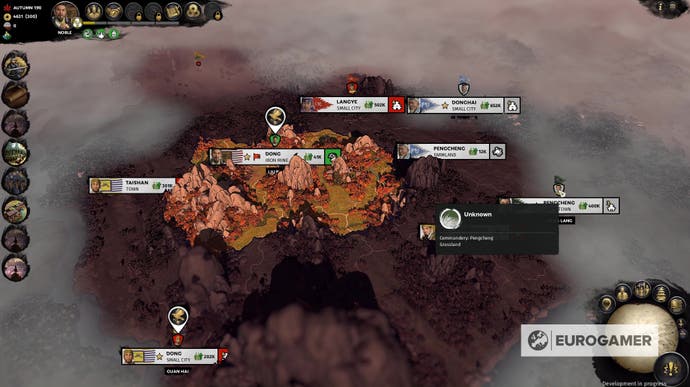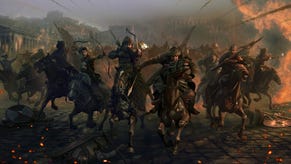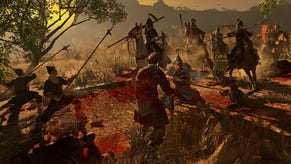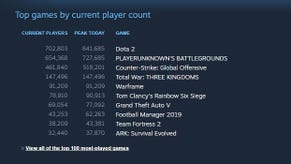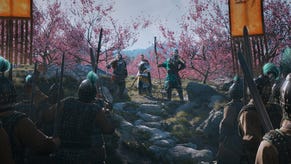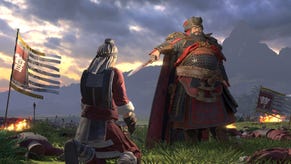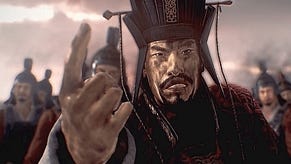Total War: Three Kingdoms turns the series on its head with a new kind of authenticity
"Dynasty Warriors to the max."
If you've shown even the vaguest interest in a Total War game before you'll know that authenticity, as nebulous a term as it can be, is really quite important - to the games and the developers as much as the players. But honestly I wonder if that's missing the point. People care about authenticity in their cannon sizes and unit descriptions, their taxation levies and upkeep costs - "the pure historical collection or list of different faction leaders, different officials, number of soldiers, operations - all the hard facts," as Game Director Janos Gaspar put it to me, when we first spoke during our battles preview last year - and sure, I like a properly proportioned phalanx as much as the next anorak. But I don't think that's the point of a Total War game.
The point of playing Total War is to feel authentic when you're playing it. To feel like you're there, in that nice little vertical slice of time, and that every decision you take feels real. For that you need more than numerical, quantifiable authenticity; you need understanding - of the period and the culture, not just of what it is to be leading an army in third century China but what it means to be leading an army in third century China. In playing a roughly three-hour chunk of Total War: Three Kingdoms' campaign - and in talking at such length with Gaspar and Lead Designer Simon Mann, both last year and again last week - I think that's something they might just have finally cracked.
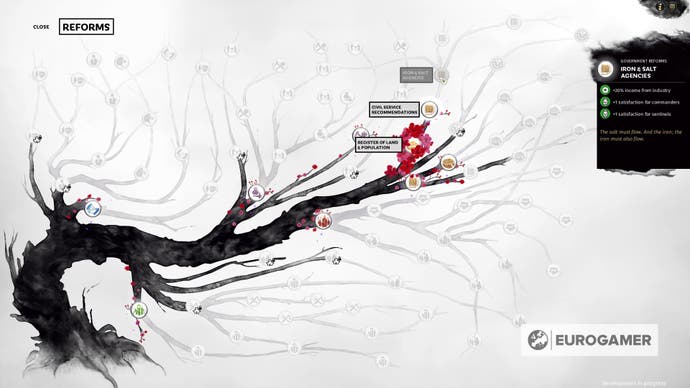
If you've been swatting up, you'll know that for the first time there are two distinct ways of playing the campaign in Three Kingdoms. There's the Records mode, which is 'classic' historical Total War based on Rafe de Crespigny's big, factual tome, with regular-sized generals surrounded by bodyguards and so on, maybe with the odd inspiring shout. Then there's the Romance mode, based on the Romance of the Three Kingdoms historical novel, which adds a sprinkle of Warhammer-esque fantasy to the battlefield with larger, stronger generals and faction leaders as veritable heroes - "a kind of, almost demigod hero, who's able to kind of swipe enemies away with a flash of his special ability," as Mann puts it. It's Romance mode that I've played both times so far, and really it's Romance that feels like the mode Creative Assembly wants to place front and centre, which I was curious about.
"One thing, I think, is that this is the new thing,” Gaspar explains. “If you look at the Records mode, it's more of a classic experience - a lot of the things… are like something that we've done before? So for us it's very exciting that we did something different with the Romance, and it's close to the Romance of the Three Kingdoms, and that's why we're talking about that this much I think."
"I guess that, because we're trying to show off all the cool new features… it's like, 'yeah, we should definitely be showing this,'” Mann continues. “Because we've not done anything quite like this side [of the Romance-Classic split] before. All of the elements are in both games as well so it's not that one's had attention and one hasn't - because both games essentially have the same trunk available to them."
That last point is one they're naturally quite keen to push - no one will feel left behind or ignored by playing the Records mode, even if Romance is the one in the spotlight. Gaspar adds that "all the features exist within both of the game modes" because it just wouldn't feel right to remove them - even the more "hardcore" Total War elements that make an appearance, like the much-requested element of military supplies affecting your foreign armies, are "something that is constantly mentioned in the novel".
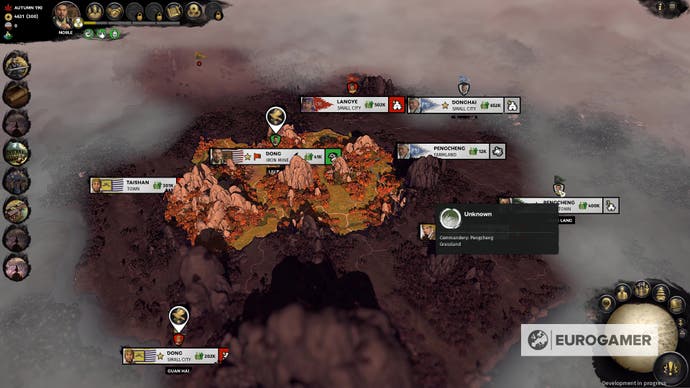
Creative Assembly seem meticulously focused on that source material, and in my experience with the campaign it actually feels like it's freed them somewhat, to tear up some of the ground rules and start again. I'd say that from my time with it so far it feels like the most conceptually different game they've released, perhaps even more so than the leap into full fantasy with Warhammer.
The key to that is what sits at the front of your mind as you're playing. Three Kingdoms is top-down, rather than the bottom-up game it's always been, by which I mean it asks you to think about your leaders first - those generals and faction leaders - and then ask yourself how those leaders' personalities and traits, their relationships and 'Guanxi' (a Chinese philosophical principle of interconnectedness) all combine to impact your armies and units, right down to what you do and when in a specific battle.
Each leader has different stats in five attributes: Authority, Expertise, Cunning, Resolve, and Instinct, which are chosen and colour-coded to match the five elements (Earth, Metal, Water, Wood and Fire) that all either feed or counter one another in perfect harmony in the Chinese philosophy of Wu Xing. Think Pokémon types, but symmetrical. Some of these match up to unit types. High Cunning (Water) gives bonuses to archer units, high Instinct (Fire) to unarmoured cavalry, which in their lightly-protected state are seemingly designed to struggle a little more against archers than usual - hence Water quelling Fire. People from Creative Assembly gave a nice talk on this at EGX if you want to dive a little deeper.
Put into words though it does sound slightly ridiculous. All of this most high-minded of philosophy often boils down to a faction leader like Liu Bei, who I played, having a zero percent upkeep cost for militia units because he's very inspiring, or plus 15 percent cavalry charge bonus because Zhang Fei's a Drunken Brawler Vanguard (I forget the actual numbers but this wasn't far off), and so on. But that's just a quirk of the genre. In practise rather than words, it works, and in fact from what I played I think it works rather well.
One thing that helps is that you can now have multiple generals in one army, as I did - so zero-militia-upkeep Liu Bei leads, with cavalry master Zhang Fei and God of War Guan Yu, who provides bonuses for spearmen, in tow. Armies apparently cap out at 21 units, which includes those three generals - and those generals themselves have their own retinues (kind of sub-armies) to which their respective bonuses apply. So you'll stack Zhang Fei's with raiding cavalry, Guan Yu's with spearmen, and so on. A balanced army is no longer just about having the right buildings in towns. It's about having the right people to lead them first.
That guiding principle of Wu Xing doesn't just affect units however, as your decisions on the campaign map are also influenced - building types are split into the same five colour-coded categories, for instance. Provinces, known as Commanderies in Three Kingdoms, have also been 'unstacked', so to speak, with a major hub city being the focal point and one or two separate settlements simply being a single building, like an Iron Mine, that can be improved. I didn't have the time to experiment with this, but one strategy might be to simply raid and capture a Commandery's strategic location, like said Iron Mine, and hold it rather than to conquer the entire thing. What we've known for a while though, which bears repeating because it's pretty neat, is that damaging a town's specific buildings in a siege will affect that specific building on the campaign map. You could theoretically besiege a settlement simply to hit a specific building and then back away, mission accomplished.
Another major overhaul in the campaign is diplomacy. The strength of the AI is impossible to test in the first couple of hours of course - and the new diplomacy system will of course rely on strong and sophisticated AI decision-making to have any kind of success - but at this first glance it appears the most intricate and involved diplomacy yet. No more hammering the 'give cash' button until someone accepts a deal, you can now trade all kinds of things, from a general's fabled horse to heirs, marriage, and support of independence. There's also the much-repeated allusion to that guanxi and sense of relationships, and interconnectedness, affecting diplomacy with other leaders in unusual ways, through betrayal and vengeance, and the like, but with that again it's just simply too early to tell whether that comes off. I certainly didn't get much of a sense of it at the start of this game, but then I wouldn't.
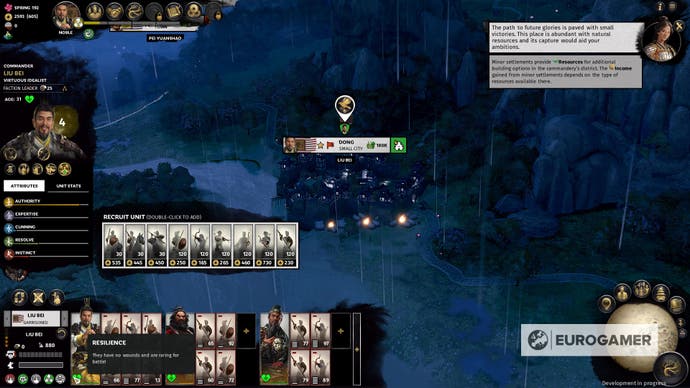
One example given to me was an in-game moment, Tao Qian Calls for Aid. As Mann explains. "So Tau Qian, who's a faction leader slightly further south-east of you, at the start, will be attacked by Cao Cao - this happens - he will be attacked by Cao Cao and you'll get the option: do you help, do you not?" The twist is, this isn't guaranteed to happen. "It's your player choice and your player fantasy as to whether you want to kind of follow those events. But, it's even potentially possible that, actually that may never happen to you, because Cao Cao might have died, he may have grown old or been killed in battle or something - or maybe even Tau Qian, if he grew old and died before it actually occurred." In other words, as Gaspar told me, "what we want is stories that happen in the novel to happen to you" - but not if all that interconnectivity and consequence gets in the way first.
That, in fact, is the only worry I have left at this point, at least barring the most minor of gripes with things like the gorgeous-but-not-always-clear UI and campaign map (there were no at-a-glance indications of army strength or size on the map like there usually are, for instance, although I'm assured they're making their way to the game in time for launch). The remaining concern is this flip on the series' head, from units first - "what do I need to earn, unlock and build to pack my armies with those cool Praetorian Guards?" - to leaders, and above those the philosophy encompassing it all. There's a chance that it might prove grating to be continually keeping those precious warlords happy at the top - I distinctly recall already having to pay one whiny recruit off with a promotion and cushty job because he was bored - but hopefully that will prove a minor aside in the grander scheme, just as it was really with my first few hours.
Still, most reassuring - and more than that, deeply encouraging - is the sense that this is the first Total War made with not just the authenticity of these philosophies and principles and actual records in mind, but with an understanding of the spirit of them. Both times I've spoken to Mann and Gaspar, they seem to very much get it, and that's such a hard thing to pin down. But when Mann says things like this it's impossible to think that they don't:
"I think that's the thing it's like, we are inspired by the source material. We've watched all the films, we've read all the books, we've even played all the games right? Dynasty Warriors to the max. But, the thing is we got really excited about this period, we were making it and already knew this is a really good fit for us, we are super excited about doing something like this - we want other people to get excited about it too, and one of the things is yeah, there are two books! This isn't just a thing where we've come up with the split, the split is the only way we could feel we justified the period, because the period is the two - we couldn't do one and not do the other. We said last time I think when we spoke about it, I feel if you're doing the Three Kingdoms these are inseparable concepts and the idea is, if we can put our passion into it and show that there is this thing, people playing the game who perhaps don't know that period are actually going to start exploring and learning about this quite timeless epic that's going on."
